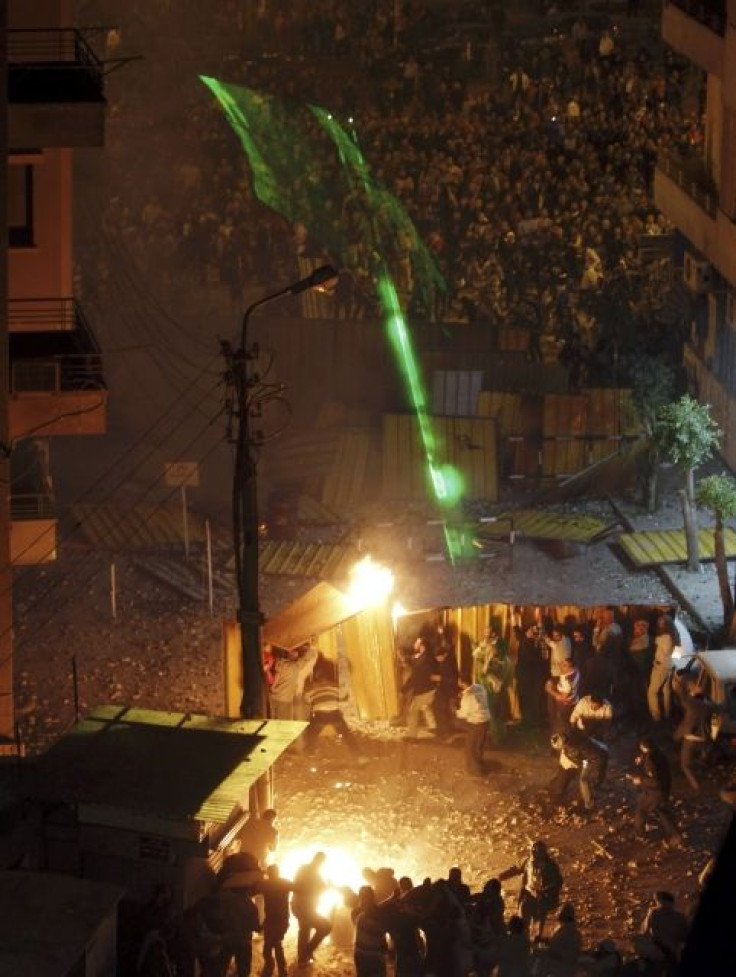Egypt Violence Claims Five Lives; Tanks Deployed Outside Presidential Palace

Egypt descended into further chaos overnight Wednesday as clashes between Egypt’s Islamists and their opponents claimed at least five lives, state media reported.
The Egyptian army deployed tanks and armored troop carriers outside the presidential palace in Cairo Thursday morning, following the night’s fighting between Islamists and the opposition using fists, rocks and firebombs, which injured 446 people, according to the state-run MENA news agency.
Reuters reported witnesses as saying that there were at least five tanks and nine armored personnel carriers in the palace's vicinity.
The streets of Cairo are now reported to be calm even as about 2,000 Muslim Brotherhood members continued to chant slogans in support of President Mohamed Morsi, Egypt Independent reported citing eyewitnesses.
Unrest has been brewing in Egypt over the decrees Morsi passed, granting him sweeping powers. The protests grew when the Islamists rushed the drafting of a new constitution, after liberals, journalists, farmers and Christian churches had boycotted the constituent assembly. The proposed constitution will be put to a national referendum by mid-December.
A new parliament will be elected after the constitution is ratified to replace the Islamist-dominated house, according to Egypt’s political timetable.
Egypt's judiciary has been in a stand-off with Morsi ever since he assumed autocratic powers that his supporters say will cut the turbulence in democratic transitional process but outraged critics who accused him of being a dictator.
Two weeks ago, Morsi stripped Egypt’s courts of the right to challenge his decrees or annul the constituent assembly until a constitution was agreed.
Wednesday afternoon, thousands of Muslim Brotherhood supporters responded to an opposition sit-in, involving some 300 people, near the presidential palace and started to chase the protesters away from their base outside the palace's main gate. The opponents, who withdrew briefly, returned with hundreds of more protesters and began pelting petrol bombs at the Islamists, the Associated Press reported.
The fighting escalated and continued well into the night spreading to the residential streets near the palace.
Hundreds of riot police were deployed to contain the violence, however, with little result. The police later resorted to tear gas to disperse Morsi's opponents. Those wounded were then rushed to hospitals.
The overnight bloodshed is possibly the most dangerous development in Egypt's growing political crisis, according to a BBC report.
Last week, Morsi sought to defuse the backlash by calling for dialogue with the opposition and stressing the temporary nature of his decree. However, the Brotherhood seemed to be pushing for a referendum on the draft constitution despite the protest.
Egypt’s Vice President Mahmoud Mekki Wednesday said the protesters would not derail the referendum.
“No political faction can think that they alone monopolize the opinion and have the majority,” he told a news conference. “The judge is the ballot box.”
If the newly issued constitution passes the public referendum, the president's controversial decrees would be lifted.
The violence spread to other parts of the country Wednesday. Anti-Morsi protesters stormed and set ablaze the Brotherhood offices in Suez and Ismailia, east of Cairo, and there were clashes in the industrial city of Mahallah and the province of Menoufiyah in the Nile Delta north of the capital, the AP has reported.
© Copyright IBTimes 2024. All rights reserved.












